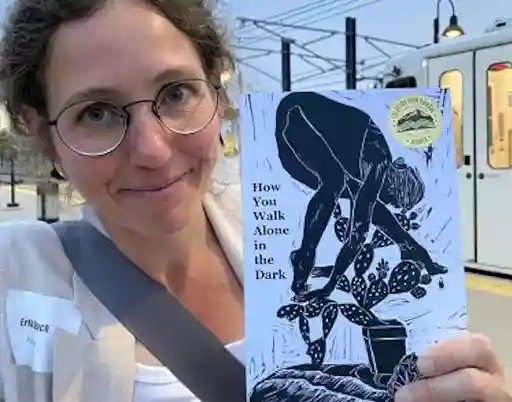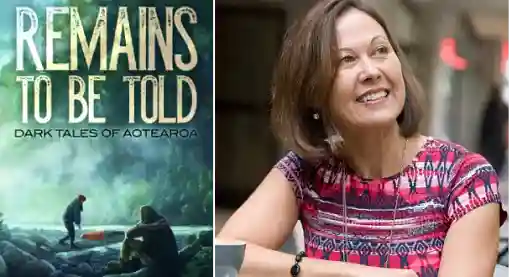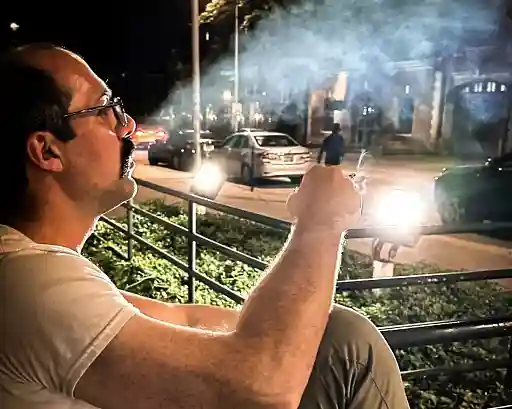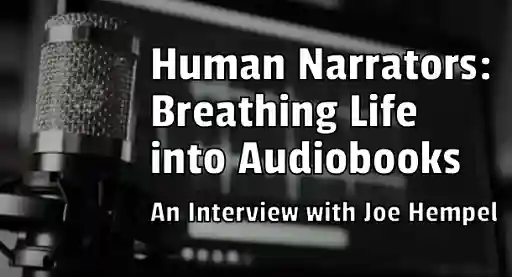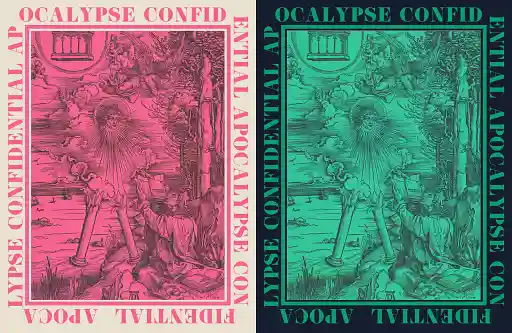Photos courtesy of the authors
I was thrilled to discover Rachel Harrison’s third novel, Such Sharp Teeth, a frightening and visceral werewolf tale that’s also a nuanced portrait of a contemporary woman’s rage and vulnerability. I’ve always been fascinated by women’s approaches to horror, and my own entry in the genre, Saturnalia, uses occult horror to explore many of the same themes: trauma, power, and the danger and exhilaration of truth-telling.
Right after Halloween, I talked to Rachel about women monsters and the horror stories we love.
In some ways, our books are very different. In your novel, Such Sharp Teeth, Rory returns home after a long absence to help out her pregnant sister. Soon after she arrives, she’s attacked by a large animal and starts going through some bizarre changes. Saturnalia is set in a near-future Philadelphia during a winter solstice celebration, and follows Nina as she battles with secret societies fighting for resources in a climate-wrecked world. She’s also bitten—if by a much smaller creature—and experiences mysterious physical effects. These stories also have a lot in common thematically. It was so exciting to discover another horror novel using monsters to investigate how women struggle with trauma, anger, and secrets.
What drew you to the werewolf? Why was it the right monster for exploring Rory’s experiences?
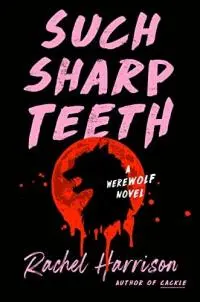 It occurred to me that there are a lot of parallels between womanhood and lycanthropy. The cyclical nature, the change once a month, the loss of control over the body—all things I could relate to. I thought the connections would be interesting to explore in a contemporary adult space, and as I was writing I continued to find more about the monster and the lore that I could connect with, and the ways that I couldn’t connect were almost even more cathartic to write. I think, in general, women are expected to be small and meek and polite and smooth and smell nice. To have Rory get to take up space and be angry and destructive and hairy and stinky turned out to be sort of freeing. Werewolves are fun!
It occurred to me that there are a lot of parallels between womanhood and lycanthropy. The cyclical nature, the change once a month, the loss of control over the body—all things I could relate to. I thought the connections would be interesting to explore in a contemporary adult space, and as I was writing I continued to find more about the monster and the lore that I could connect with, and the ways that I couldn’t connect were almost even more cathartic to write. I think, in general, women are expected to be small and meek and polite and smooth and smell nice. To have Rory get to take up space and be angry and destructive and hairy and stinky turned out to be sort of freeing. Werewolves are fun!
They are! One of the terrifying things about a werewolf transformation is losing control, but that’s what makes it fun and liberating, too. Rory can, and will, do whatever she wants. So much of horror, I think, is about what happens when natural and social rules break down, and that’s why gender and sexuality are often key concerns. Women are under pressure to behave and live a certain way–or, we’re told, all of society will break down. (See: fear campaigns about women having sex, or choosing when to have kids, or remaining single, or forging partnerships with other women.)
Rory has distanced herself from her mom and hometown, while my main character, Nina, has distanced herself from the elite social club where she was climbing the ranks of Philadelphia society. Both women are reacting to being sexualized and victimized by men, and both are angry.
The monsters in Saturnalia are derived from alchemical experiments in creating human life. One is in pursuit of Nina, while the other is under Nina’s protection. Neither one of us created a Final Girl who has to kill their pursuer; both Nina and Rory have complicated relationships with the monsters they encounter. Do you think there’s something human about your werewolves?
Yes, I think so! It's always surprising to me how writing monsters challenges my own perception of what is monstrous, forces me to confront what I fear and why. Quite frankly, I feel the same way when it comes to writing about womanhood. Why have I internalized that it’s bad to express my anger? Why do I feel ashamed of being angry in the first place? Why do I feel like it’s wrong to say no? Why am I so afraid of being perceived as rude or unlikable, and why do I prioritize others' comfort over my own wellbeing? What behaviors have I been raised to believe are good and what behaviors have I been raised to believe are bad? Thinking about werewolves through the lens of Rory’s experience, there was more nuance there than I’d anticipated in terms of “is this really so bad?” Is the monstrousness a curse, or is it a gift?
As you mentioned, Rory and Nina are both struggling with their anger and past traumas—they initially suppress, retreat, avoid, because they don’t seem to know what else to do with it all. Rory becoming a werewolf simultaneously facilities and complicates the acceptance and expression of her anger and of her past. Nina also has to reckon with her anger, which she’s very much internalized. The monsters in our stories force our characters to confront their anger and their traumas. Do you think anger is a key element in horror by and about women?
I’m not sure, but I’ve noticed it’s a key element in the horror I write. My first novel, The Angel of Losses—a kind of contemporary, Gothic fairy tale—has a furious woman protagonist, too. I think it’s scary when women behave in ways we’re not supposed to, and acting out of anger is one of those things. At the same time, the things that make us angry are terrifying, too. Rory and Nina are both violent at times, but I was more frightened by the violence inflicted on them. And the silencing! Rory’s family is in denial about her abuse and Nina is too ashamed to tell her loved ones what happened to her.
That’s another big thing they have in common: secrets. There’s a famous book, The Body Keeps the Score, about how emotional and psychological pain affects us physically. Nina and Rory are both bitten by monsters, and both undergo physical changes. I guess those changes could be a metaphor for the painful secrets they carry—but I think our monsters are more liberating. Our women aren’t monstrous because of their secrets, but becoming monstrous allows them to face those secrets.
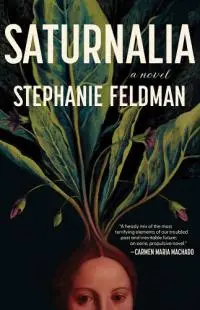 Aside from our own characters, who are of course fabulous, do you have any favorite monstrous or villainous women in horror?
Aside from our own characters, who are of course fabulous, do you have any favorite monstrous or villainous women in horror?
I’m a big fan of Carrie, both the book and the original film. As an adolescent misfit, it really just blew my mind. I was rooting for the character causing chaos and death! The young female protagonist wasn’t just frolicking through a field of daisies or waiting for love and/or rescue. She was getting sweet, brutal revenge. There’s something cathartic about it, don’t you think?
Absolutely! So cathartic I don’t even think of her as a villain, though I guess her powers do make her monstrous. It’s actually pretty hard, now that I think about it, to identify a villain who is vibrant enough—or perhaps layered and three-dimensional enough—to be a favorite without also being sympathetic enough to be a hero, or anti-hero, at least. Of course, I love a witch, like Nancy from The Craft (who is pretty terrible, but also extremely cool), and the werewolf girls from Ginger Snaps.
The evil female figures who scare me the most are the ones who kill children. There are lots of these in folklore. What could be more monstrous for a woman than being anti-maternal? Still, these monsters and demons have another side to them, too. For example, see La Llorona, the Latin American ghost. In one version, she weeps for the children she drowned, an act of revenge against the husband who abandoned her. She’s dangerous, a threat to children who wander too close to the water. But in other versions, she drowned the children to save them from their father. She’s also associated with La Malinche, the indigenous mistress, translator, and accomplice to Hernán Cortés. La Malinche is a symbol of betrayal, but she was also enslaved—how could Cortés’s actions become her fault?
Anyway, these days, I’m very into dangerous water spirits like La Llorona. I have a feeling they’ll show up in my work sooner or later. Do you have any monsters waiting for you on the back burner?
I’d love to see your take on a water spirit, though I have to admit I’m still recovering from Saturnalia, which has some of the most terrifying and inventive monster moments I’ve ever read. As for what’s next for me, I feel like the monsters are always waiting. Vampires are sort of looming like a horror Everest, a challenge I’m tempted to tackle. Maybe a succubus—doesn’t get more classic lady monster than a succubus. I’m optimistic for a bright future with many dynamic, layered, fun, cathartic monster stories.
Get Such Sharp Teeth at Bookshop or Amazon
Get Saturnalia at Bookshop or Amazon

About the author
Stephanie Feldman is the author of the novels Saturnalia and The Angel of Losses, a Barnes & Noble Discover Great New Writers selection, winner of the Crawford Fantasy Award, and finalist for the Mythopoeic Award. She is co-editor of the multi-genre anthology Who Will Speak for America? and her stories and essays have appeared in Asimov’s Science Fiction, Catapult Magazine, Electric Literature, Flash Fiction Online, The Magazine of Fantasy & Science Fiction, The Rumpus, Vol. 1 Brooklyn, and more. She lives outside Philadelphia with her family.
